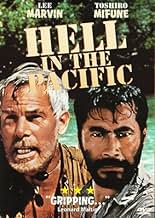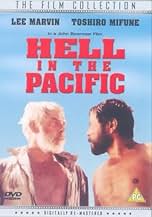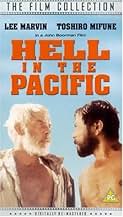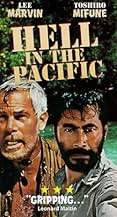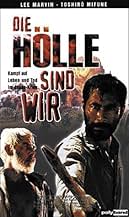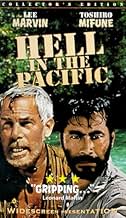PUNTUACIÓN EN IMDb
7,2/10
9,5 mil
TU PUNTUACIÓN
Durante la Segunda Guerra Mundial, un piloto Americano y un capitán de la armada Japonesa se encuentran en una pequeña isla del Océano Pacífico. Ahí, deben poner fin a su hostilidad y cooper... Leer todoDurante la Segunda Guerra Mundial, un piloto Americano y un capitán de la armada Japonesa se encuentran en una pequeña isla del Océano Pacífico. Ahí, deben poner fin a su hostilidad y cooperar si quieren sobrevivir, pero ¿lo harán?Durante la Segunda Guerra Mundial, un piloto Americano y un capitán de la armada Japonesa se encuentran en una pequeña isla del Océano Pacífico. Ahí, deben poner fin a su hostilidad y cooperar si quieren sobrevivir, pero ¿lo harán?
- Dirección
- Guión
- Reparto principal
- Premios
- 1 premio y 2 nominaciones en total
Toshirô Mifune
- Captain Tsuruhiko Kuroda
- (as Toshiro Mifune)
Reseñas destacadas
I only discovered Hell in the Pacific after searching for Lee Marvin films as I have become enamored with his work as of late. I thought this was going to be a war movie from start to finish, which I'm not always a big fan of. I am glad to say I was surprised and very pleased with this film.
This is a rare work of film that uses two actors, limited dialog(half of it in Japanese), and only one location. There have been many attempts at making movies about people stranded on islands, but this one pulls it off in a way no other has.
Thsi is a film about not only survival, but overcoming prejudice towards ones sworn enemy in a time of war. It is about moving past the fears of what you do not know, and using what you do know and the basic need to survive to pull through and band together.
I was more enthralled by this movie with almost no dialog, than I have been with movies that have won screenplay Oscars. To me, this is an example that if you have the right actors, the right story, and the right setting, dialog is not always necessary.
This is a rare work of film that uses two actors, limited dialog(half of it in Japanese), and only one location. There have been many attempts at making movies about people stranded on islands, but this one pulls it off in a way no other has.
Thsi is a film about not only survival, but overcoming prejudice towards ones sworn enemy in a time of war. It is about moving past the fears of what you do not know, and using what you do know and the basic need to survive to pull through and band together.
I was more enthralled by this movie with almost no dialog, than I have been with movies that have won screenplay Oscars. To me, this is an example that if you have the right actors, the right story, and the right setting, dialog is not always necessary.
What I would give to know only Japanese and watch this movie. You don't have to understand what Toshiro Mifune is saying to understand this movie.
Does war extend to the individual? Trained to kill or be killed, two adversaries face off. Each with his own fear that the other will succeed. Why didn't they kill each other when they had the chance? Because man is a social animal and he needs the company of others. To use a cliché - No man is an island.
And in the end conflict erupts. Not because of any innate difference between the two men - but because of how they define themselves in a greater scene. I am Japanese - you are American (and vice versa). Throw in the element of non-communication (neither spoke any of the other's language) and you have it.
Two great actors, a great script, a grand theme.
Does war extend to the individual? Trained to kill or be killed, two adversaries face off. Each with his own fear that the other will succeed. Why didn't they kill each other when they had the chance? Because man is a social animal and he needs the company of others. To use a cliché - No man is an island.
And in the end conflict erupts. Not because of any innate difference between the two men - but because of how they define themselves in a greater scene. I am Japanese - you are American (and vice versa). Throw in the element of non-communication (neither spoke any of the other's language) and you have it.
Two great actors, a great script, a grand theme.
A Japanese naval officer and an American pilot find themselves stranded alone on a desert island during WWII. How would you react to being marooned with a dangerous enemy? This film is an obscure treasure that should be better known. I suspect that people are put off by the cheesy and unsuitable title. The film explores the evolving relationship of two men from different cultures as they each struggle to find the best way to survive. Their collective fate is an exploration of the human condition.
One outstanding feature of this film is that it is in both Japanese and English, intentionally without sub-titles. An American or Japanese audience could watch this film and appreciate its message. This duality serves to heighten the cultural differences between the two men, and it is cultural bias that is the true enemy.
Buy it, it's a keeper!
One outstanding feature of this film is that it is in both Japanese and English, intentionally without sub-titles. An American or Japanese audience could watch this film and appreciate its message. This duality serves to heighten the cultural differences between the two men, and it is cultural bias that is the true enemy.
Buy it, it's a keeper!
Not only is this film a fascinating account of survival against odds, its a reflection of cultural differences within a crucial historical timeframe. Its narrative may be flawed, a little too stylized, but it features two of the greatest faces of 60s cinema history: Marvin and Mifune. Looking back on the second world war, it seems ironic that the Japanese believed their culture was superior in warfare, and the Americans believed theirs was superior for peace. In the end it will turn out to be the other way around. This film touches on that subject, highlighting Marvins aggressive, loud, and brutal behavior, and Mifunes quieter, more methodical survival methods. But in their battle to survive, the two men become almost indistinguishable. The most touching scene in the film: Both men collapsed in their sinking raft, dejected, exhausted, dehydrated, totally at their mercy of nature, a symbolic scene for human life. The DVD i saw contained both endings, the original, never seen in TV prints, much more believable and satisfying.
Was there a better hard man in the 70's then Lee Marvin ? I don't think so. Team him up with Toshiro Mifune (yojimbio, Seven Samurai), gorgeous scenery (Paulau islands) under the light hand of John Borman (Deliverance) and watch as a simple story grows and develops into a visual feast. There is no lead-in to the film, all we see is a lone Japanese soldier on a tropical island spotting a life raft and realising he is suddenly not alone, and worse, his company is an enemy soldier. The initial confrontations are tension filled as the two chase each other around and around their new home in a battle of wits and cunning. Eventually the inevitable happens and they are forced to start living together. Rather than a Disneyish style 'lets all learn to live together because we are all really the same under the skin' co-operation, the two have as little to do with each other as possible, unless arguing about possession of driftwood (in a scene that left me in tears of laughter). Eventually they do co-operate through necessity to leave the island and develop a bond of friendship through adversity, only to have this challenged when exposed to the realities of the world outside their desert island refuge. A bitter but unavoidable ending reminds us of the insanities of war. I loved this film because it was totally gripping in a way few movies are, I genuinely cared about the characters. It was in some ways like watching 'survivor' in the way the relationship changed-only in reverse- so naturally did it happen on screen. Bormans direction was great, more of a fly on the wall perspective that made the story all the more involving. This movie deserves to be seen.
¿Sabías que...?
- CuriosidadesBoth Lee Marvin and Toshirô Mifune actually served in the Pacific during World War II, of course on opposing sides. Marvin was a US Marine. He was wounded during the war and received the Purple Heart during the Battle of Saipan in 1944. Mifune served in the Imperial Japanese Army Air Service.
- PifiasLee Marvin was 44 at the time of filming, as evident by his gray hair. Toshiro Mifune's character also calls him an "old man" several times. WWII US Navy pilots Thus, he looks much too old for an actual WWII US Navy pilot, who were mostly in their twenties or early thirties.
- Citas
American Pilot: Oh, for a second I thought you were a Jap.
- Versiones alternativasAmerican version featured an alternative ending where the two get drunk and walk off in separate directions arguing at each other; in the British version (which was exactly the same as the Japanese version), they start yelling and a bomb from the sky falls and blows everything apart.
- ConexionesFeatured in Hollywood Remembers Lee Marvin (2000)
Selecciones populares
Inicia sesión para calificar y añadir a tu lista para recibir recomendaciones personalizadas
- How long is Hell in the Pacific?Con tecnología de Alexa
Detalles
- Fecha de lanzamiento
- País de origen
- Idiomas
- Títulos en diferentes países
- Hell in the Pacific
- Localizaciones del rodaje
- Empresas productoras
- Ver más compañías en los créditos en IMDbPro
Taquilla
- Presupuesto
- 4.150.000 US$ (estimación)
- Duración
- 1h 43min(103 min)
- Relación de aspecto
- 2.35 : 1
Contribuir a esta página
Sugerir un cambio o añadir el contenido que falta


